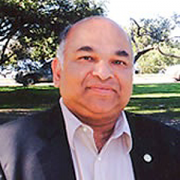To talk about myself, I need to talk a little first about my background. My father was from South India and was transferred to Vietnam on a diplomatic and business mission by the Indian High Commission. My mother was born in South Vietnam and of Chinese descent. So, my family environment was a traditional Asian one, but was also a mix of Hindu and Buddhist traditions. I was born in 1950, in Saigon, Vietnam and grew up during the tumultuous period of the Vietnam civil war. After high school I did my compulsory military training and then entered Saigon University where I studied medicine. I completed my training in 1975 in pediatrics and began working at Saigon Children’s Hospital. The notion that I would become a psychiatrist, let alone be interested in cross-cultural psychiatry was the furthest thing from my mind at that time. All that changed with South Vietnam coming under the rule of the Communist North. I was sent to a “Re-education Camp” for six months. The euphemistic name belies the fact that they were essentially prison camps. After my release I left Vietnam in 1976, I went to Singapore where I lived in a refugee camp for six months. I suppose it was during this time that my interest in cross-cultural and refugee issues was planted.
As I mentioned earlier, my father had been a diplomat with the Indian High Commission in Vietnam, and so I was able to move to India. I eventually settled in Madras and completed a fellowship in Cardiology. I later worked at Perambur Hospital for about three years until 1979. As fate would have it, I moved to France afterwards and did a fellowship in Emergency Medicine at Louis Mourier Hospital in Paris. It was there that I applied to go to Canada.
By 1981 I found myself in Vancouver, British Columbia, Canada, where for the third time, I recertified as a physician. While I waited to take the equivalent qualifying exam to return to medical practice, I worked at various jobs completely unrelated to medicine. I worked as a forklift driver, a restaurant manager and even a lay Buddhist monk! My time in Canada was a major period of learning for me. Like so many times before, I had to adapt to a new culture, language and education system, but this time cross-cultural, refugee, and immigration issues were at the forefront of my mind. How could they not be, as I had lived in three countries in the span of six years? This was a key turning-point in my career as I decided to do a psychiatry residency.
It was during this time that my real cross-cultural work began. As a Vietnamese refugee myself, I began to research the settlement and adaptation issues of Vietnamese refugees. I was able to get the first federal funding to set up a settlement services programme to assist Vietnamese refugees, between 1984 and 1985.
It became apparent to me that although Canada was a multicultural society, there were (at that time) very few culturally relevant mental health services in Vancouver. I became a member of the Canadian Task Force on Mental Health Issues Affecting Immigrants and Refugees, set up in 1988 by the Ministry of Health and Ministry of Immigration. This brought immigrant and refugee issues to the forefront. With such momentum we were able to found VAST – the Vancouver Association for the Survivors of Torture and create the first cross-cultural outpatient psychiatric clinic in Canada. We now have seven psychiatrists, providing services in 19 different languages, with over 4,000 visits to the clinic each year. We recently completed the translation of a multilingual website (Chinese, Vietnamese, Spanish, Farsi, Punjabi, Korean, French, Urdu, and Russian) in conjunction with the British Columbia Ministry of Health to provide information and educate immigrants about mental health – www.heretohelp.bc.ca
On the clinical side, I have actively participated in the development of training curriculum for psychiatry residents in cross-cultural mental health, as well as psychiatry and spirituality.
We have also successfully organized an annual Cross-cultural Conference. Now in its 12th year, it brings together clinicians, educators, social workers, journalists, and consumers, to discuss and promote relevant topics in the field of cross-cultural mental health. I was deeply honored at last year’s conference to have the annual award presented at this conference to be renamed the “Soma Ganesan Spirit of Hope” award.
My current positions include Medical Director, Psychiatry, Vancouver General Hospital and University of British Columbia Hospital; Medical Director for Adult Mental Health Services, Vancouver Community, and Vancouver Coastal Health; Physician Leader for Riverview Hospital: Full Clinical Professor for the Department of Psychiatry (since 1997), University of British Columbia, and Director of the Division of Cross Cultural Psychiatry; Commissioner for the Forensic Psychiatric Services Commission. Through all these positions I have been an advocate for mental health services for immigrants, refugees and people of all cultures; trying to convince researchers, government officials, policy makers and others of the importance of cross-cultural psychiatry.
My own research focuses on immigrant mental health, cross-cultural psychiatry, and spirituality. It is my hope to be a contributor to WPA’s Transcultural Psychiatry Section and to aid in the growth of the World Association of Cultural Psychiatry.
June 3, 2008

